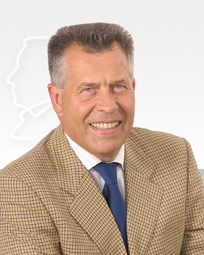Karlsberg prepares for the future
New heads, new brands - an atmosphere of departure throughout the Karlsberg Group.
At its annual press conference in September, the Karlsberg group of companies, which is privately owned by Germany’s Brewers Association President Dr Richard Weber, and whose interest cover beer, beverages, frozen foods as well as logistics, announced important decisions with regard to personnel. The group, in whose German beer business Heineken has held a 45 percent stake since 2003, is renowned for its innovation drive. Only two years ago, it presented a wellness beverage, Karla, that is sold through a network of German pharmacies. Soon Karlsberg is to launch a new alcohol-free beer brand Gründel´s. The brand will soon appear in a new décor and in two varieties: classic und fresh.
More importantly, however, the Karlsberg Group is, gradually preparing for the future with respect to personnel: As Dr Weber, Acting Partner of the Karlsberg Group, had already indicated in 2005, the present Managing Directors of the brewery, Uli Grundmann and Gerhard Theis, and Udo Helfgen, Managing Director of the French beer division, will be promoted to the holding management.
They will support the present management of Dr Weber and Heinz Seibert. ‘I announced this step,’ said Dr. Weber, ‘at an internal conference nearly two years ago. This way, a new generation will be taking over step by step.’ Dr Weber, who is 63 years old, hopes to retire in a few years’ time.
International brewer Heineken is making its presence felt more strongly now. At the beginning of the year, Alle Ypma, who was General Manager of Heineken’s Brau Union Hungary, joined Karlsberg as General Manager of Karlsberg’s German beer business. That way Dr Weber hopes to strengthen his company’s ties with Heineken. At least this is what he said.
As of 1 September this year, Dr Hans-Georg Eils, long-standing head of production at Beck’s, has moved to the position of the new head of technology and logistics at the Karlsberg brewery in Saarland. He is replacing Bernd Sowada, who is to retire.
In the fiscal year of 2006/2007, the Karlsberg Group had a turnover of EUR 686 million. The group, which refuses to publish volumes, achieved a turnover of EUR 339 million in its beer business, up from EUR 316 million in the previous year. Soft drinks had a turnover of EUR 270 million, which compares favourably with the previous year’s turnover of EUR 258 million.
According to Dr Weber, the German beer market continued to be problematic. The football world cup had presented just a brief phase of recovery. The president of the German brewers association predicted that ‘the consumption curve, which has been declining for 30 years, will continue to do so, although, in the best case, less steeply.’ Falling beer consumption is affecting the traditional draught-beer business as well as returnable branded products. Although the industry continues to receive impulses from beer mixes and other innovative products, a trend which Karlsberg managed to exploit for itself, the traditional beer business was forced to follow the general market trend of declining consumption. The domestic development was primarily influenced by the implementation of a beer price increase in the summer of 2006, in which some competitors, however, did not participate, said Dr Weber. Overall, sales in beer and beer mixers increased in comparison to the previous year. Nevertheless, the growth in this segment resulted mainly from higher sales abroad.
MiXery continues to be a top brand in the beer mix segment. The development of MiXery as an umbrella brand has been very successful, said Dr Weber. Three mixes – lemon, cherry and wheatbeer with cola – make for a variety of tastes. However, the strong presence of discount brands in the beer mix segment and the increasing competition did affect sales, which remained below the previous year’s level. “MiXery and Desperados are supraregional brands in our portfolio, which we will continue to develop,” announced Dr Weber.
France has seen encouraging results. Compared with the previous year, sales increased significantly. The goal of the French beer segment was to optimise the retail brand business, to develop the specialty segment, to stabilise sales of draught beer and to improve internal structures, said Dr Weber.
For OKKO Getränke, Karlsberg’s soft drinks division, the fiscal year was influenced by preparations for a restructuring of the German Coca-Cola business. As Coca-Cola has changed its strategy from several regional bottlers to just one anchor bottler, the Karlsberg Group was forced to transfer its Coca-Cola business to the unified licensee CCE AG, of which the group will be holding shares. The group will continue to distribute the range of Coca-Cola products. How this change is going to affect sales and profits, next year’s figures will show.
Speaking as the President of the German Brewers Association, Dr Weber forecast that over the next five years beer prices in Germany could rise by some 40 percent due to increased raw materials prices.

